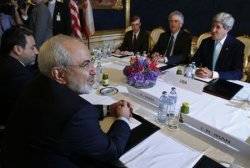Nuclear talks between Iran and six world powers appear likely to be extended past their target end date of July 20 after the sides failed to reach an agreement in Vienna.
John Kerry, the US secretary of state, and fellow foreign ministers met in the Austrian capital on Sunday to try and advance the talks with Iran, with a target date only a week away for a pact meant to curb programmes that Iran could turn to for making atomic weapons.
Other countries represented included Britain, France, Germany, China, and Russia. Mohammad Javad Zarif, Iran's foreign minister, also attended the Vienna negotiations.
Officials with knowledge of the talks said deep differences continued to separate the two sides.
Frank Walter Steinmeier, the German foreign minister, said the ball was in "Iran's court now".
"It is now up to Iran to decide whether they are looking for a way to cooperate with the international community or if they want to remain in isolation," Steinmeier said.
"I hope the days until July 20th will be enough to allow Tehran to reflect and at the end pave the way for an agreement. The ball is in Iran's court now."
The main focus on Sunday was easing the dispute over Iran's enrichment programme.
An extension of the talks would give more time to negotiate a deal that would limit the scope of such programmes in exchange for a full lifting of nuclear-related sanctions imposed on Iran.
'Significant gaps'
Before the meeting convened by Catherine Ashton, EU's foreign policy chief, Kerry said: "Obviously we have some very significant gaps still, so we need to see if we can make some progress."
"It is vital to make certain that Iran is not going to develop nuclear weapons, that their programme is peaceful. That's what we are here trying to achieve."
But the top diplomats from China and Russia sent lower-ranking officials to the negotiations, a move that could reflect their view that an extension was unavoidable.
Abbas Araghchi, Iran's deputy foreign minister, spoke on Saturday of "huge and deep" differences. But he told Iranian TV that "if no breakthrough is achieved, it doesn't mean that [the] talks have failed".
Discussions center on imposing long-term restrictions on Iran's uranium enrichment and against plutonium production materials usable in nuclear warheads. In exchange, the US and other powers would cancel a series of trade and oil sanctions against Iran.
Al Jazeera's James Bays, reporting from Vienna, said there had been some progress made since an interim deal was made in November, despite the parties' differences.
"Both sides are saying they'd rather get a deal now and the Iranian deputy foreign minister says that if there was an extension he only wants a matter of days," he said.
Iran says its programme is solely for peaceful energy production and medical research purposes, though much of the world fears it is a covert effort towards nuclear weapons capability.
PHOTO CAPTION
Iran's Foreign Minister Mohammad Javad Zarif (L) meets with U.S. Secretary of State John Kerry (R) at talks between the foreign ministers of the six powers negotiating with Tehran on its nuclear program in Vienna, July 13, 2014.
Aljazeera


 Home
Home Discover Islam
Discover Islam Quran Recitations
Quran Recitations Lectures
Lectures
 Fatwa
Fatwa Articles
Articles Fiqh
Fiqh E-Books
E-Books Boys & Girls
Boys & Girls  Ramadan
Ramadan Fatwa Audios
Fatwa Audios Month of Mercy
Month of Mercy Women
Women Eed Al- Fitr
Eed Al- Fitr Food Recipes
Food Recipes Videos
Videos

 Prayer Times
Prayer Times












